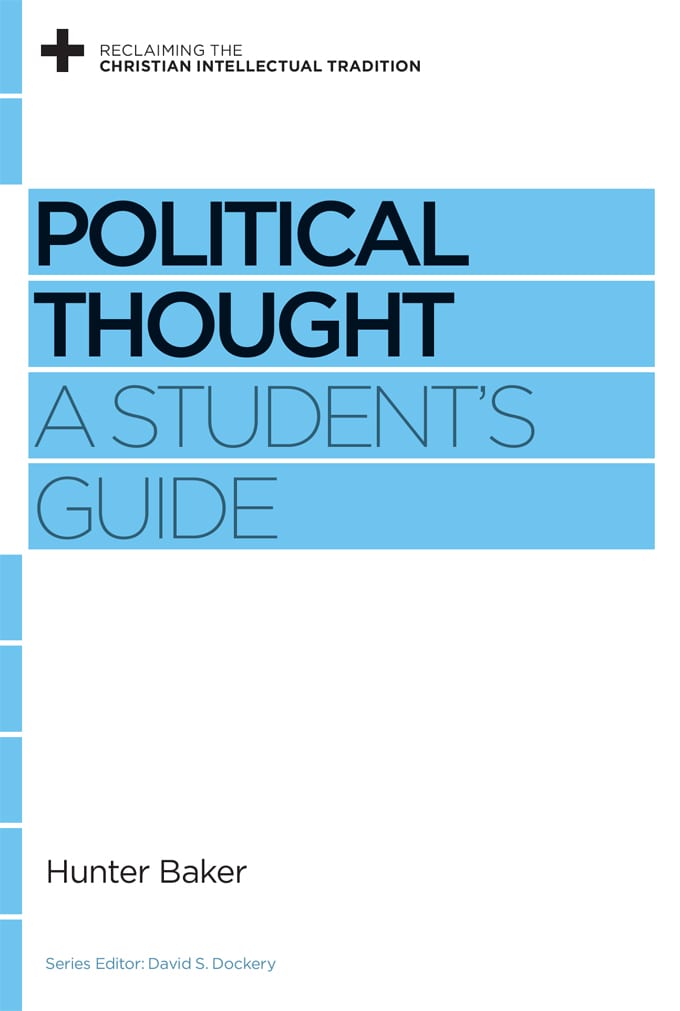One of the most important experiences in my life was teaching an adult Sunday school class in political philosophy. I discovered that a surprisingly large number of Christians want to learn about this subject, but they didn’t encounter it in college and now have no one to teach them. So I quit writing books for fellow scholars and started writing books for laypeople.
That’s why I hope the title of Hunter Baker’s short but smart Political Thought: A Student’s Guide doesn’t limit its audience to current college students. At just over a hundred pages, this is a highly accessible book many adults would also benefit from reading. Baker’s aspirations are limited, befitting his short space, so the book is not likely to appeal to those seeking a really meaty intellectual engagement with the subject. However, those limitations also give the book a broad user-friendliness; people curious about political philosophy and starting with zero knowledge are likely to find it a helpful first step.
How to Introduce Political Philosophy?
Baker, associate dean of arts and sciences at Union University in Jackson, Tennessee, is conducting a daring experiment in how to get people interested in political philosophy. The two traditional ways to start people with this field are historical (begin with the trial of Socrates and then tell the story of the great thinkers in chronological order) and analytical (lay out some scheme of fundamental issues such as individual vs. community, order vs. freedom, truth vs. power, progress vs. continuity). Both of these methods tend to connect deeply and inspire great passion in a minority of students, while leaving the majority cold. Baker, however, is aiming to break that mold and reach the majority.
This field is notoriously difficult to explain to beginners. The basic problem was well put by Allan Bloom, one of the most important writers on political philosophy in the last century. A real interest in political philosophy requires the student to care equally for knowing the truth and doing justice. Unfortunately, in practice most people respond much more intensely to one of these imperatives than the other. Those who care more about knowing truth are turned off by the strict limits constantly imposed in political philosophy by the needs of practical application; they prefer the free exercise of the mind permitted in the study of science or literature. Those who care more about doing justice are impatient with its inability to provide a short set of bullet-point marching orders; they prefer the results-oriented methods of law, politics, business, and engineering.
Baker introduces political philosophy through an intuitive approach. Instead of a grand historical narrative or a dry but clear analytical framework, he uses everyday anecdotes and analogies to convey the gist of his subject. The analytic structure and (to a much lesser degree) history of political philosophy emerge as the book unfolds, but they are not the focus.
For example, Baker begins the book by describing the different ways his family and his wife’s family behave at family gatherings. His family likes to break up and do separate activities so everyone can enjoy the time doing what they want, while her family likes to do things all together. He is somewhat put off by the togetherness of her family, which feels forced and limiting to him; she is somewhat put off by the differentiation of his family, which feels isolated and alienating to her. Like families, Baker writes, political communities have to balance the needs of community with the needs of individuality. Different communities, like different families, have coped with the problem in different ways.

Political Thought: A Student’s Guide
Hunter Baker
Politics affect everyone everywhere. Yet most people do not know how to communicate or think methodically (much less unemotionally) about the issues at hand. What we need is for our thinking to be grounded in the basic framework of order, freedom, justice, and equality. Award-winning professor Hunter Baker helps political amateurs gain a foundational understanding of the subject and encourages seasoned political observers to find a fresh perspective in this book. Learn how to fruitfully consider and discuss politics, and gain a greater capacity for evaluating political proposals and the claims that go with them.
Another example: Baker smartly uses the television show Lost, in which characters are stranded on an island, to set up a discussion of early modern political ideas. For example, the character Sawyer’s selfish behavior in the early episodes highlights the Hobbesian dilemma of power and competing survival desires. His later assimilation into the group plays into the Lockean strategy of circumventing that dilemma through shared conceptions of justice rather than through Hobbes’s strategy of arming a sovereign with superior power. It’s a fine way of setting up the basic ideas, and frankly I wish I’d thought of it.
Keeping It Simple
Baker’s method radically simplifies the subject matter, and this creates both opportunities and limitations. This book does a very good job performing a limited function: getting people interested in political philosophy and helping them grasp some important introductory concepts. It does not really do much beyond that goal.
Because of its method, this book is likely to be more useful than any other on the market to readers who just want someone to give them the gist of the basic ideas—and there are a lot of those readers. Baker does a great job of presenting the field of political philosophy in a way that will make the average layman see why it is interesting. He has done us a service by thinking so far outside the box. I pray this book will reach many people and introduce them to this field of study, in which so much of the Lord’s glory is revealed to us through the moral framework of humanity’s social nature.
Baker’s simple approach also helps communicate some of the key concepts that Americans in particular desperately need to recover in our times. His discussion of the distinction between what he calls “vertical justice” (righteousness before God) and “horizontal justice” (fair play among human beings) is quite good:
It is an empirical fact that in a political community of any significant size, there will be individuals and/or sizeable minorities who do not fit within the dominant religious group. It is also a fact that history tells a regrettable story about the treatment of those individuals. They have frequently been marginalized, persecuted, and sometimes killed. . . . Many theorists review these events and conclude that political systems must be secular in orientation in order to give reasonable respect to the fact of pluralism (the phenomenon of different beliefs, ethnicities, etc.). I think such a claim goes too far (72-73).
In our day, evangelicals are more and more thirsty to work for justice, and God bless them for it, but not enough of them are stopping to navigate these difficult but crucial distinctions.
I also greatly appreciated the clarity and appeal Baker brings to discussion of two of the field’s other classical problems: the differences between the family and the state, and the paradoxical nature of order in society. Family and state are analogous in some ways, yet too strong an identification between them facilitates all kinds of injustice. You can’t keep order without force, and yet a social order that is merely the imposition of force—a dictator (or for that matter a majority of the voters) arbitrarily imposing his will—is not really order at all; it’s only a sort of slow-motion warfare by other means. In the midst of our cultural struggles today, which too often boil down to conservative and progressive religious subcultures competing to impose their will upon one another, the future of America may depend on whether we can recover this idea.
Keeping It Contemporary
The book’s simplicity also imposes limitations. Baker’s intuitive discussions are so loose and open-ended they sometimes come across as a stream of consciousness. Readers seeking greater precision or coherence will be frustrated. For example, the purpose of political philosophy as a field is stated not up front, but halfway through the book. Main points of discussion often occur at the end of paragraphs or sections, not at the beginning where efficient readers will be looking for them.
More importantly, following his method, Baker cannot introduce any big questions that cannot be made immediately intuitive to the typical moderately educated American in early 21st-century America. Unfortunately, most of the field of political philosophy falls into that category! Baker’s introduction to the field is thus more introductory than most. The reader is not really getting an overview of the field, but an overview of that relatively small portion of the field that is most accessible and relevant to contemporary readers.
Three striking features of the book illustrate how closely it is bound to contemporary concerns. First, the classical thinkers get virtually no attention; this may well be the first introductory text on political philosophy ever published containing no substantial treatment of Plato or Aristotle. Second, while a few Christian figures are treated in the book’s main sections, the encounter between Christianity and political philosophy mostly appears in a separate chapter at the end, with no structural connection to the rest of the book. Third, Baker has included a chapter describing his own political views, and it is clearly meant to connect with the political events and exigencies of early 21st-century America.
All this is very good for helping people get into the subject from a starting point that is already familiar and interesting. As I’ve said, this book will do great service by introducing people to political philosophy. However, the most important and glorious function of political philosophy is that it takes you out of the narrow constraints of your own time and culture. The most famous image of political philosophy (from Plato) is that of having lived in a dark cave all your life and then standing gloriously in the sun. It is in the light of that sun that we first see how thoroughly our ideas about justice have been shaped by the assumptions and problems of our native time and culture. Christians above all others should appreciate the value of being equipped to think critically about culture in such a way.
Another limitation is the two-dimensional treatment many figures receive. Some of Baker’s subjects get well-rounded analyses; it was particularly smart of him, given the contemporary concerns he’s connecting with, to reserve a large block of space for going over both the positives and the negatives of John Stewart Mill. Yet in many other cases, complex figures are oversimplified—further than necessary even in an introductory work of this nature. The field’s traditional list of “good guys” (e.g., Locke, Rawls) are treated too sympathetically; its traditional “bad guys” (e.g., Hobbes, Rousseau) are made to look much worse than they really are.
Great Invitation to a Great Field of Knowledge
None of this should detract from Baker’s pedagogical achievement, however; it is only to identify the book’s proper function. In an introductory class on political philosophy, it could be used very effectively as a reading assignment for the first week. A good teacher could use this book to help students get over the initial introductory doubts (“why should I care about this?”) and then spend the rest of the semester broadening the picture and filling in the gaps.
And I hope the book will find audiences outside the classroom as well. The urgency of immediate political problems in our time—marriage, life, materialism, crony capitalism—has hollowed out our store of the deeper wisdom that only political philosophy can show us. Baker’s book will help people realize that behind all the big questions in the daily headlines there is another layer of questions, the deep questions, the basic assumptions we make about how we live together. The deep questions are so big, they’ll never appear in the headlines as “big questions.” That’s why we’re always in danger of forgetting them. Baker’s book will help people begin to see what they are and why they matter.



































